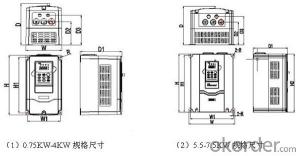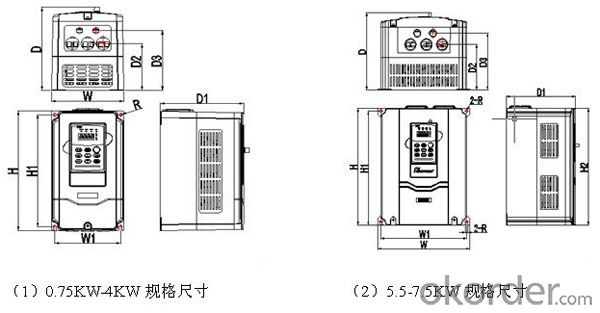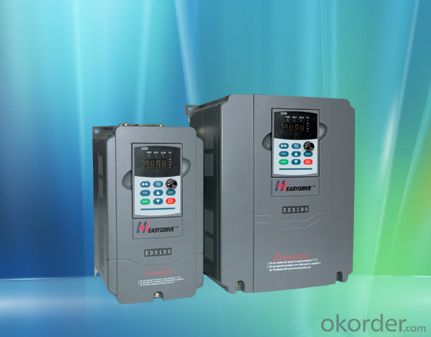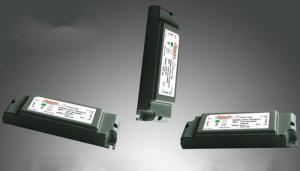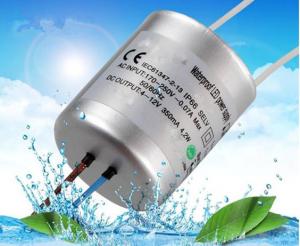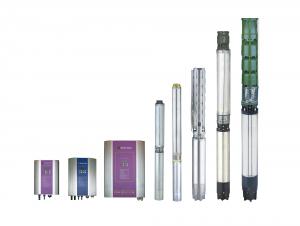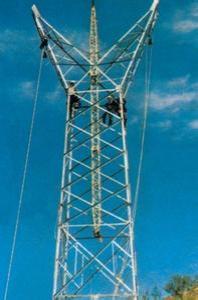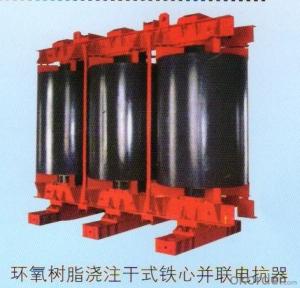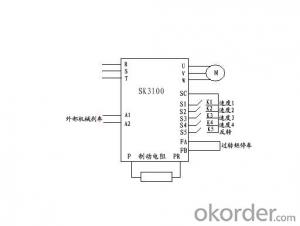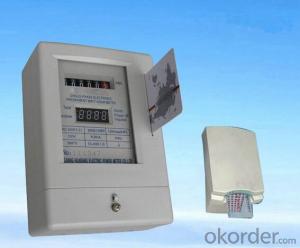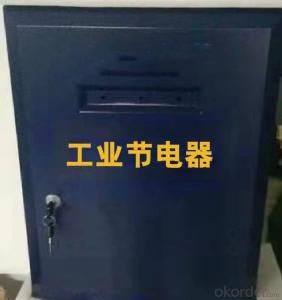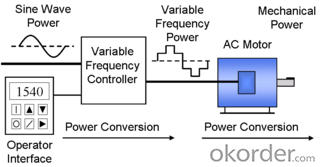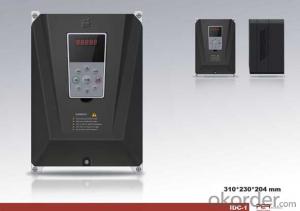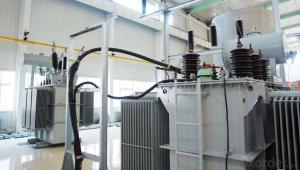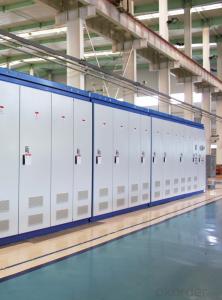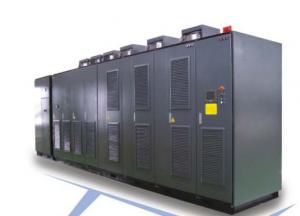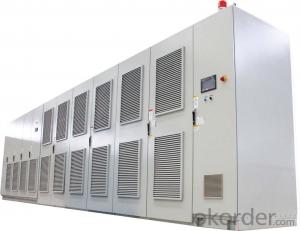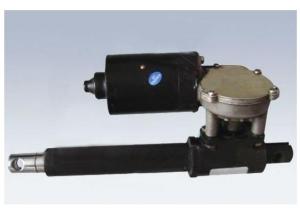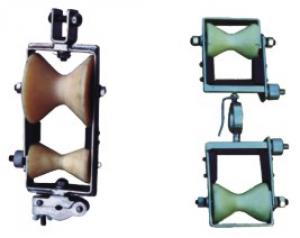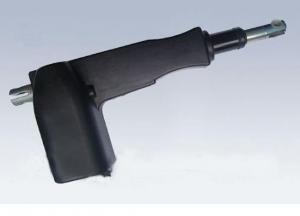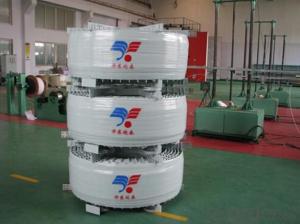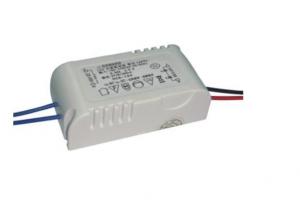High Quality Variable-frequency drive-lx3100_01
- Loading Port:
- Ningbo
- Payment Terms:
- TT OR LC
- Min Order Qty:
- 1 unit
- Supply Capability:
- 10 unit/month
OKorder Service Pledge
OKorder Financial Service
You Might Also Like
A variable-frequency drive (VFD) (also termed adjustable-frequency drive, variable-speed drive, AC drive, micro drive or inverter drive) is a type of adjustable-speed drive used in electro-mechanical drive systems to control AC motor speed and torque by varying motor input frequency and voltage.
VFDs are used in applications ranging from small appliances to the largest of mine mill drives and compressors. However, around 25% of the world's electrical energy is consumed by electric motors in industrial applications, which are especially conducive for energy savings using VFDs in centrifugal load service,[5] and VFDs' global market penetration for all applications is still relatively small. That lack of penetration highlights significant energy efficiency improvement opportunities for retrofitted and new VFD installations.
Over the last four decades, power electronics technology has reduced VFD cost and size and has improved performance through advances in semiconductor switching devices, drive topologies, simulation and control techniques, and control hardware and software.
VFDs are available in a number of different low- and medium-voltage AC-AC and DC-AC topologies.
System description and operation
VFD system
A variable-frequency drive is a device used in a drive system consisting of the following three main sub-systems: AC motor, main drive controller assembly, and drive/operator interface.
AC Motor
The AC electric motor used in a VFD system is usually a three-phase induction motor. Some types of single-phase motors can be used, but three-phase motors are usually preferred. Various types of synchronous motors offer advantages in some situations, but three-phase induction motors are suitable for most purposes and are generally the most economical motor choice. Motors that are designed for fixed-speed operation are often used. Elevated-voltage stresses imposed on induction motors that are supplied by VFDs require that such motors be designed for definite-purpose inverter-fed duty in accordance with such requirements as Part 31 of NEMA Standard MG-1.
- Q: Garbage disposal is wired into open electrical outlet down thru basement. Dryer is not vented outside, which is in the basement also, right next to this outlet. There is excessive lint from the dryer all over this open outlet that doesnt have a cover and the live electrical big thick white wire that you wire a house with is split down the middle then the raw metal part is inserted into each side of the outlet for the garbage disposal. If I pull this out to disconnect it will it spark? Shock me? Catch on fire? I want to do this because I am afraid it is going to catch on fire from all the lint. Is that possible also?I rent and I know the dryer should be vented, however it is all glass block windows and landlord has yet to fix it so please dont tell me to vent the dryer. thanks
- vent the dryer.important.
- Q: explain the difference between an insulator and a conductor
- the simple explanation is that an insulator does not allow the flow of electrical current, while a conductor allows the flow of electrical current. typically rubber and plastics are used for insulators and metals such as gold and copper are used for conductors
- Q: I was wondering this, as I'm a smoker and never smoke in the house (due to owning expensive computers and such).Would the vapor from an E-cig be safe around electrical equipment? I would presume no, since the water vapor instantly evaporates after being breathed out, as apposed to smoke which lingers around and is rougher than air, which overtime damages fans and circuitry it passes over. Thanks for reading.-Karu
- blow it the other way
- Q: If it is, why?
- it is not. that is why there is test equipment that does just that (measure earth resistance). resistance is function of resistivity, area of the corsssection and length of the medium. due sheer size of the electrodes placed in ground we can achieve large contact surface. undergroud water and minerals also reduce resistance. different applications may requre that earth resistance is below some limit. if the limit is small value, grounding will be big job and cost a lot. many new buildings have metal strips placed along foundations (to get large contact surface). dry soil is less conductive and values can vary quite a bit.
- Q: i would like to know more about the functions of this room. What is the role of this room in electrical distribution in a building? What i know,an electrical components need to get through this room such as for lighting+ac, power socket, and essential power.
- A riser room is where the electrical distribution equipment ( Switchgears and Panels) that supplies the electrical systems of the building is located. Electrical conduits that feed the various equipment, A/C units and sub panels and fire pumps originate here.
- Q: exactly 5 min later:a- Would it damage the power grid?b-Would sudden surge after 5 min create even a bigger loss in energy than what was saved in that 5 min period??I am not an electrical engineer? I keep hearing that sometimes turning off an energy source for short term does not really save any energy? Is that true?Thanks alot.Could you help me with these 2 points?
- Yes, in this extreme case, it may damage (BOE calculation: 2 million x ~500 watts: ~1 billion watt) if they are on single grid. In many of equipment (motorized) start-up losses are significant. So, you may end-up with little saving and a big grid failure. But if you leave aside such extreme situations, it is always good to turn off electrical equipments even for a short gap. And just to add, beware of leaking currents (e.g. not disconnecting appliances from the power plug) which are bigger concern.
- Q: i have some powerful amps and other electrical equipment in my car and am wondering if all of that is pulling so much that it is affecting performance
- Absolutely.
- Q: I plan to major in electrical engineering. I wanted to know if the stuff I learn there will allow me to do things like fix machines and stuff.I picked this major because I wanted something I can use at home
- Yes and no. The basics will be covered in both theory and some lab exercises, but the bulk of what you learn as an electrical engineer, will be power generation/distribution and industrial applications, not domestic. There will remain a whole lot of best practices and regulations electricians know about, but you will have to research on your own if you want to maintain/expand the electrical system in your house. So, yes you will be qualified if you inform yourself about the practicalities, but it won't make you a qualified electrician be default.
- Q: How long did it take you to complete? What job do you have now? I am interested in going to school for that and wondering what type of jobs I might have.
- I am currently studying to be an electrical engineer. It takes on average 5 years to get a Bachelor's degree. However some schools offer yu the chance to also obtain your masters in 5 years (requires alot of extra work). Electrical engineers have a wide gambit of job options. Often they involve jobs with heavy analytical problem solving, you also will be very fluent in mathematics as you will probably be required to maintain an astute understanding of calculus and physics. My father was is/was and electrical engineer who fixed medical equipment at hospitals, a field engineer. You may also be hired for you ability to solve problems rather than technical skills. It all depends what ou want to do though. My major electrical engineering with a robotics focus, so there are alot of jobs for electrical engineers.
- Q: I would like to know about background historical trends in heavy electrical equipment industry in India and future prospects of sourcing heavy electrical equipments in India.If you have any report or thesis on similar topic, please share with me.It would be of immense help to me.
- Suggest that you contact the Indian embassy, trade department, they will probably give you a list of suppliers.
Send your message to us
High Quality Variable-frequency drive-lx3100_01
- Loading Port:
- Ningbo
- Payment Terms:
- TT OR LC
- Min Order Qty:
- 1 unit
- Supply Capability:
- 10 unit/month
OKorder Service Pledge
OKorder Financial Service
Similar products
Hot products
Hot Searches
